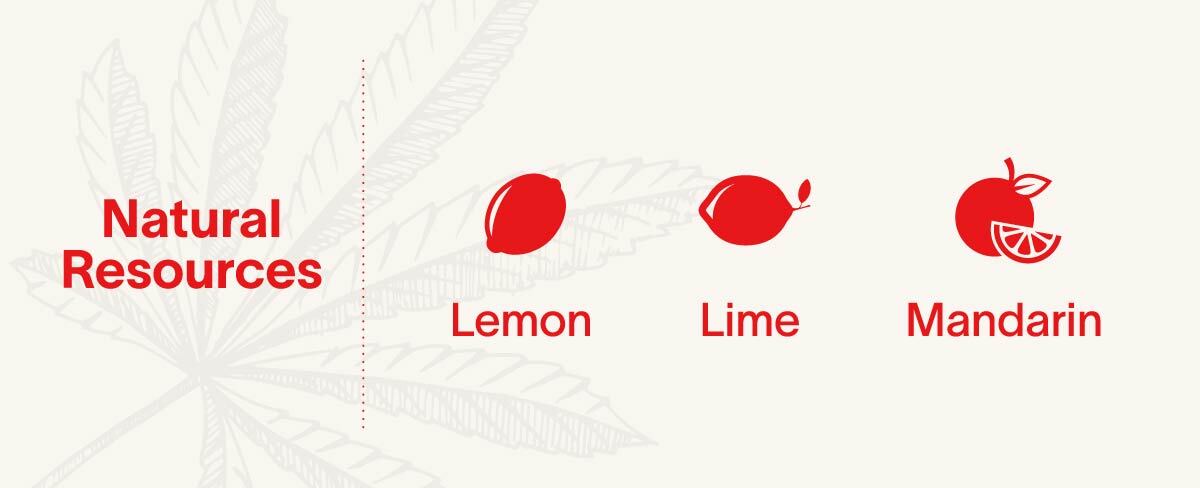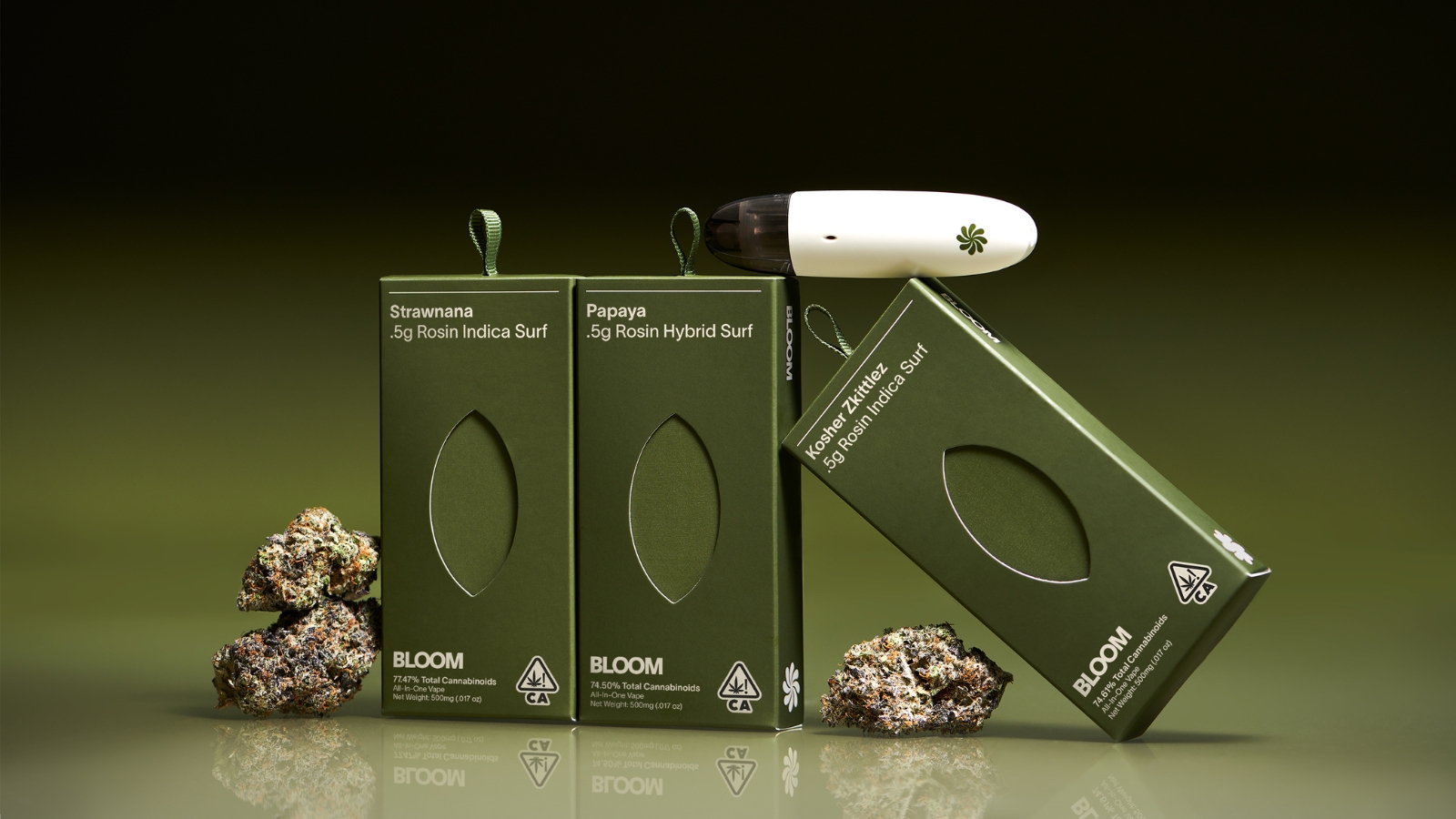Terpenes are volatile aromatic compounds found throughout the plant kingdom. Although common in much of the plant life around us, including foods we eat, terpenes are often associated with cannabis. Rightfully so, as terpenes are responsible for proving each strain’s unique flavor and aroma. Yet, that’s not all they do. Terpenes also affect our mood, and work alongside cannabinoids to create each strain’s effects.
This post talks about limonene, one of the most abundant terpenes found in the trichomes of the cannabis plant. Let’s explore what limonene is, its many benefits, and which of our Bloom strains contain high amounts.
Limonene Overview
Limonene is the second most prevalent terpene in cannabis, but ranks number one among fruits, herbs, and spices. It’s easily identifiable by its zesty, citrusy aroma, most commonly associated with lemons and other citrus fruits. While naturally occurring, extraction is a popular way to obtain larger quantities. For example, we use it in cosmetics, cleaning products, pesticides, foods, and supplements, among other everyday items.
How to Pronounce Limonene
You might hear it pronounced a little differently as pronunciations include a long ‘i’ and a slight variation to the emphasis on the first and second syllables: [lie–muh-neen].
What Is Limonene?
Limonene is a naturally occurring terpene that is colorless when extracted. Its boiling point is 349 degrees Fahrenheit, and this precious terpene is sensitive to light, air, and heat. It is a cyclic monoterpene, and there are two isomers: L isomer and D isomer.
L-limonene is the less common isomer primaril found in pine cones or pine needles. You might recognize its distinct aroma in the industrial cleaning product, turpentine.
What Is d-Limonene?
D-limonene is present in larger concentrations in lemons, oranges, and cannabis. This isomer is what you commonly find as a fragrance in soaps, detergents, chewing gum, or insecticides.
Common Limonene Effects
We use this zesty terpene for many reasons. You can use it medicinally to treat or manage ailments, or therapeutically to affect mood or emotion. Here are a few reasons why you might reach for a product or cannabis strain high in limonene:
- Decrease stress and anxiety: When used in aromatherapy, limonene decreases feelings of stress and anxiety, promoting a calmer mood. The same effects are observed when consuming cannabis strains high in limonene.
- Anticancer properties: One study observed that people who consume citrus peel have a lesser risk of developing skin cancer than those who only drink citrus juice. Another study found that consuming two grams of pure limonene for a period of two to six weeks showed a significant reduction in the tumor cells of breast cancer patients.
- Anti-inflammatory properties: Chronic inflammation is problematic in ulcerative colitis and osteoarthritis. Laboratory research on human cartilage cells indicates that limonene (and other terpenes) reduce inflammation in a cell model of osteoarthritis. While human studies are not yet confirmed, experiments on lab rats treated for ulcerative colitis show the effects of limonene to reduce inflammation and colon damage.
- Immune support: Limonene behaves as an antioxidant, fighting free radicals that cause cellular damage. Limonene uses may also expand to include harnessing its immunomodulatory and antiviral properties to limit the severity of COVID-19.
When used in cleaning products, this fresh and astringent terpene shows off its potent antimicrobial and antiviral properties, as well as its ability to de-grease surfaces. In addition, its fresh aroma adds an enjoyable burst of citrus scent to any cleaning task.

Limonene Flavors & Aroma
When combined with other terpenes found in cannabis, limonene merges flavors and aromas to produce a symphony of citrus combined with pungent, floral, gassy, woody, and earthy scents. However, it is unique and easily identifiable on its own.
What Does Limonene Taste Like?
Simply put, it’s fruit-forward, tasting like the juice of a lemon, lime, or orange. It’s bitter and a bit sour but with an underlying sweet earthiness.
What Does Limonene Smell Like?
Overall, it most closely resembles the smell of lemons. The L isomer smells more like piny turpentine, whereas the D isomer smells more like oranges.

Foods with Limonene
As the second most prevalent terpene on the planet, limonene is found in a wide variety of plants and herbs. By no means a complete list, here are some of the most common places you’ll find it in nature:
- Lemon
- Lime
- Orange
- Grapefruit
- Mandarin
- Rosemary
- Ginger
- Turmeric
- Mint
- Basil
- Bay leaf
- Parsley
- Sage
- Hops
- Red Pepper
Orange peels contain an exceptionally high percentage of d-limonene, comprising up to 97% of the peel’s essential oils. Since orange peels are a waste byproduct of orange juice, limonene is rarely produced synthetically due to its high availability.
High Limonene Strains
Lovely limonene is found in many strains you are likely already familiar with and have probably enjoyed. For example, the following strains contain significant amounts:
- Lemon Diesel
- Super Lemon Haze
- Lemon Pound Cake
- Gelato
- Purple Punch
- White Fire OG
- Mimosa
- Grapefruit Kush
- Super Sour Diesel
There are several crosses of these genetics with high levels of this bright, juicy terpene so just ask your budtender what they recommend if you’d like to try something new.
Try Terpinolene with BLOOM
We love limonene and have several strains boasting bold profiles featuring this dominant terpene. Try our Strawnana or Papaya Live Rosin for a true connoisseur experience. Live rosin is a solventless concentrate retaining all of the plant’s original terpene and cannabinoid content. It’s like chewing on a piece of Juicy Fruit!
From our collection of Classic Strains, we have Super Lemon Haze, GSC, and Champagne Kush. Each one offers a complex, rich flavor with limonene front and center.





